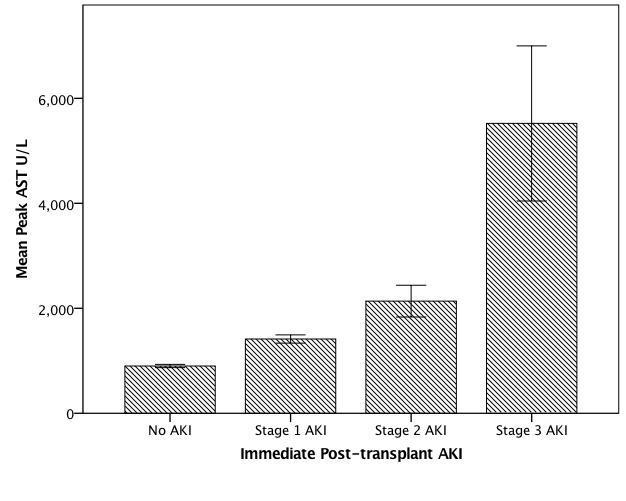Hepatic Ischemia Reperfusion Injury After Liver Transplantation Is Associated with Acute Kidney Injury.
1Department of Surgery, Division of Transplantation, Indiana University School of Medicine, Indianapolis, IN
2Department of Nephrology, Indiana University School of Medicine, Indianapolis, IN
3Department of Medicine, Division of Gastroenterology and Hepatology, Indiana University School of Medicine, Indianapolis, IN
Meeting: 2017 American Transplant Congress
Abstract number: 428
Keywords: Ischemia, Liver, Renal injury
Session Information
Session Name: Concurrent Session: Kidney Issues in Liver Transplantation
Session Type: Concurrent Session
Date: Tuesday, May 2, 2017
Session Time: 2:30pm-4:00pm
 Presentation Time: 3:06pm-3:18pm
Presentation Time: 3:06pm-3:18pm
Location: E451b
Background: The impact of liver allograft ischemia/reperfusion injury (IRI) on native renal function remains to be characterized. We hypothesized that severity of IRI correlates with incidence of acute kidney injury (AKI) after liver transplantation (LT).
Methods: Retrospective analysis of single center liver transplant database was carried out on 1700 consecutive adult patients receiving isolated LT between July 2001 and July 2016. AKI within 48 hours after LT was graded as per Acute Kidney Injury Network (AKIN) staging system. Surrogate marker for hepatic IRI was peak post-transplant aspartate aminotransferase (AST) within the first 48 hours. Categorical classification of IRI based on peak AST (U/L): 1) minimal: <600, 2) Mild: 600-2500; 3) Moderate: >2500–5000 and 4) Severe: >5000. Renal function at 1-year post transplant was noted as MDRD eGFR.
Results: IRI was observed in 54% patients [mild (44%), moderate (7%) and severe (3%)]. AKI was observed in 31% [stage 1(26%), stage 2(4%) & stage 3(1%)]. IRI was significantly associated with AKI (p<0.0001). IRI was significantly associated with requirement of renal replacement therapy within immediate post-transplant period (p=0.001). AKI was associated with worse 1-year and 5-year but not overall graft and patient survival. Mean MDRD eGFR at 1-year post transplant was worse in patients with immediate post-transplant AKI (69.9 ± 1.3 vs. 79.4 ± 1.6; p=0.01). Multivariate analysis demonstrated IRI, warm ischemia time and grade of donor liver steatosis as significant risk factors for developing AKI.
Conclusions: Post LT AKI is common and has adverse impact on long-term native renal function and patient survival. Hepatic IRI contributes significantly to post LT AKI. Maneuvers to prevent IRI and/or AKI may protect long-term renal function.
CITATION INFORMATION: Kubal S, Anderson M, Fridell J, Ekser B, Taber T, Li P, Ghabril M, Lacerda M, Mangus R. Hepatic Ischemia Reperfusion Injury After Liver Transplantation Is Associated with Acute Kidney Injury. Am J Transplant. 2017;17 (suppl 3).
To cite this abstract in AMA style:
Kubal S, Anderson M, Fridell J, Ekser B, Taber T, Li P, Ghabril M, Lacerda M, Mangus R. Hepatic Ischemia Reperfusion Injury After Liver Transplantation Is Associated with Acute Kidney Injury. [abstract]. Am J Transplant. 2017; 17 (suppl 3). https://atcmeetingabstracts.com/abstract/hepatic-ischemia-reperfusion-injury-after-liver-transplantation-is-associated-with-acute-kidney-injury/. Accessed February 19, 2026.« Back to 2017 American Transplant Congress
